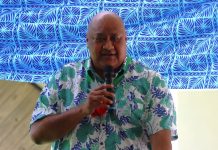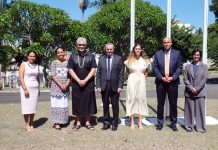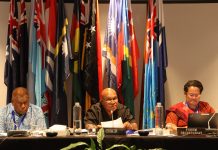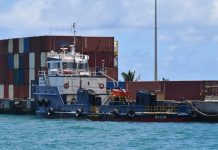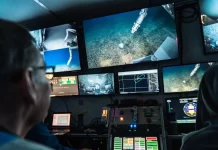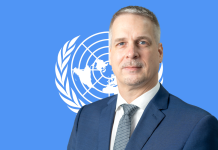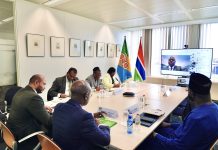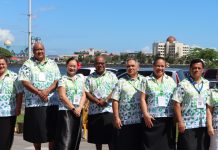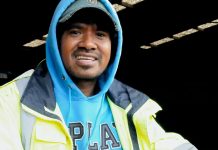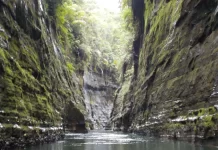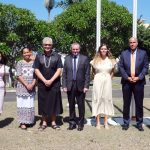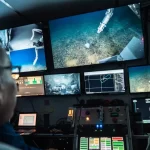By Kalinga Seneviratne
Addressing the impact of climate change on oceans and coastal communities requires input from all academic disciplines, an emphasis on collaboration and greater involvement of local communities.
The importance of connectivity was foregrounded at the annual meeting of university presidents of the Association of Pacific Rim Universities (APRU) held at the University of Auckland, New Zealand this week under the theme: “Oceans – The World’s Challenges Divide Us, the Ocean Currents Connect Us”.
The conference, held from 24-26 June and attended by over 120 heads and representatives of 61 APRU member universities which span Asia, the Pacific, North America and Latin America, delivered an overview of what a diverse range of universities are doing to address climate change and its effects on the ocean through research, student activities and working with communities.
But the conference also noted it was vital for researchers to partner with other sectors, including industry, to make a bigger impact.
This article is part of a series on Pacific Rim higher education and research issues published by University World News and supported by the Association of Pacific Rim Universities. University World News is solely responsible for the editorial content.
University of Auckland Vice-Chancellor and APRU Vice-Chair Dawn Freshwater, in opening remarks, noted the Pacific Ocean is the largest and deepest ocean basin in the world, covering more than 30 percent of the Earth’s surface and holding more than half the Earth’s open water supply.
“Our region confronts many existing and emerging sustainability and geopolitical challenges,” she said.
“We’re in the South Pacific and not only species but other whole islands and their communities are threatened, just on our back door step. I’m referring to the small island states of Kiribati, Nauru and Tuvalu. We’re already seeing people from these islands migrate due to worsening climate conditions,” she added.
Freshwater’s comments were made against the backdrop of figures from UNESCO’s 2020 Intergovernmental Oceanographic Commission report which show that member states allocate just 1.7 percent of research budgets to ocean sciences.
Imminent challenges include rising sea temperatures affecting the marine ecosystem, severe biodiversity loss, frequent extreme weather and ocean acidification.
Freshwater spoke in the wake of a powerful Maori welcoming ceremony known as pwhiri led by Michael Steedman, Kaiarataki deputy pro vice-chancellor, Maori Waipapa Taumata Rau (Auckland university’s Maori name), which set the tone of the gathering, many sessions of which were led by Maori and Pacific leaders.
‘We are the ocean’
In a keynote speech titled “Think like a fish – an ocean-centric vision”, Dan Hikuroa, associate professor of Maori Studies at the University of Auckland said: “Runaway climate change, massive biodiversity loss, an intolerable social and environmental inequality among people are simply the three most serious symptoms of the same root problem. They must be tackled together.”
Hikuroa argued that historically, European explorers had a terrestrial vision of the islands as “isolated dots” in the vast Pacific Ocean. But, “Oceania is vast. Oceania is expanded. Oceania is hospitable and generous. The Oceania is us; we are the ocean,” he said.
While noting a focus on climate change, particularly in the world’s media, Simon Thrush, director of the Institute of Marine Science at the University of Auckland, said it was important to recognise that “we’re in the middle of a biodiversity crisis and that we’re in the middle of a sustainability crisis”.
To tackle these “we need to work with people. The problems were generated by people, the solutions will be generated by people,” Thrush said. The challenge is how universities can work with societies “that are often uninformed”.
Indigenous-led research
During a discussion by a panel of university vice-chancellors and presidents on “Navigating the Tides”, Bill Flanagan, president and vice-chancellor of the University of Alberta in Canada, said the university was working with indigenous communities in the region to improve their nutrition standards.
The project known as Arramat brings together 19 Canadian and 14 international universities, and involves 140 indigenous-led research projects.
“This is a project that is working in 24 countries around the world in 30 different languages, looking at Indigenous food systems and economic effects, and in particular the impact that climate change is having on Indigenous food systems and economic wellbeing, and the way in which Indigenous peoples can devise and develop solutions,” Flanagan said.
Masahiko Gemma, a professor in the Faculty of Social Science at Waseda University in Japan and the university’s vice-president for international affairs and international fundraising, pointed to a five-year postgraduate and research programme that Waseda runs with 13 other partner universities in Japan to educate professionals on the power generation industry and its connection to social issues.
He pointed to two significant characteristics of their approach. “One is a transdisciplinary approach to produce experts in power supply who can be knowledgeable about multiple research areas, including the humanities and social science.
“The other is flexibility to work in different environments … [Because] the power industry needs experts trained in multiple disciplines who can be future leaders,” he said.
Nancy Ip, president of Hong Kong University of Science and Technology (HKUST), noted that universities cannot tackle the ocean challenge within single disciplines. “We must embrace the expertise from various fields,” she said. “Research itself is not enough. We must collaborate”.
Ip pointed to the Sustainable Smart Campus project at HKUST, describing it as a “living lab” in which research and collaboration with communities leads to action on the ground. “It not only engages our community members, but we also engage beyond the campus. So, some of the projects that we work on provide real-world solutions,” she said.
“Testing it out on our campus and then taking it beyond the campus to the community is one way to engage our community,” she explained.
The Amazon is like an ocean
Diego Quiroga, rector of Universidad San Francisco de Quito in Ecuador, likened the River Amazon to an ocean, and called for similar ecological approaches. “The Amazon, believe it or not, is considered to be a moving ocean, in a way, because of the importance of water for that ecosystem. So, we work a lot with the Indigenous communities that live in the Amazon,” he said.
The university works with Amazon communities looking into the materials that they use, including plant fibres, and helping to provide a scientific base for their knowledge.
“[That] has a lot of implications, as far as how you protect their property rights is concerned and how you protect their knowledge [because] Western companies or Western scientists come and just extract that. It presents a lot of challenges from a legal-ethical point of view,” he said.
Speaking during a session on “Protecting biodiversity in the Oceans”, Professor Yatimah Binti Alias, deputy vice-chancellor (academic and international) at the University of Malaya in Malaysia, said her university uses also uses the “living lab” concept to work with coastal seaweed cultivators to improve their livelihoods.
“We know there’s a lot of research in seaweeds as well, and we know the potential of seaweeds, and this is where all the research is coming together,” she said. “This project aims to develop a global strategy to protect, conserve, and restore wild seaweeds while supporting the livelihoods of seaweed farmers and their communities,” she explained.
International collaboration
In a video address to the conference New Zealand’s Science, Innovation and Technology Minister Judith Collins said: “International collaboration enhances the quality of research by bringing together diverse perspectives and expertise. This diversity leads to innovative solutions and groundbreaking discoveries that single institutions might not achieve on their own.”
She added: “By working tgether on research and science efforts, we can leverage our unique strengths and address regional challenges more effectively.
“I find it exceptional how our shared efforts amplify our impact and drive progress across the region, whether it’s improving disaster resilience, promoting sustainable development or enhancing technological innovation for climate change adaptation initiatives,” she said.
APRU Chair Rocky Tuan, who is also president and vice-chancellor at the Chinese University of Hong Kong, noted: “We’re all from a country, a region, an economy that touches the water of the Pacific. The Pacific really symbolises our shared global community and the common challenges we face.
“Addressing the climate impact on our oceans and its effects on communities and indigenous populations reminds us of APRU’s vital role in fostering constructive dialogue, collaborative research, impactful work, and real world solutions.
“The future is a little fuzzy these days. But our job is to bring sunshine to this cloudy future.”
He said that collaboration was “more than a MOU [memorandum of understanding]” between universities, noting that, “collaboration requires the partners to have common interests, a common purpose”.
Freshwater said: “Our challenge today and tomorrow is to strengthen our partnerships so that APRU members can collectively meet their obligations in the region with solutions to unique Pacific manifestations of the global challenges we face.”
Women in Leadership Programme
APRU’s Asia Pacific Women in Leadership Programme, which held its summit the day before the conference, received a powerful message from Ziena Jalial, chief of staff at Te Pkenga, New Zealand Institute of Skills and Technology, who grew up in Fiji.
“Many young women, particularly women of colour, disabled and migrant women, have a hard time securing roles in their universities and [there are] a range of reasons for this including not having the right connections or networks. In New Zealand many in our Maori and Pacific communities are the first in their families to go to university,” she said.
Jalial, who also sits on the board of Education New Zealand, the government agency responsible for international education, said: “I felt the burden of the communities I represent, because if someone from a dominant group screws up, we don’t stop hiring people from those groups. But when you screw up as a minority, there’s a view that perhaps your community is not fit.
“Universities, as the critic and conscience of society, can also play a leading role in shining a light on gender equality issues at the societal level, in informing national policies, which can make a difference, and in supporting the education of future generations to build a stronger pipeline of women across all fields.”


